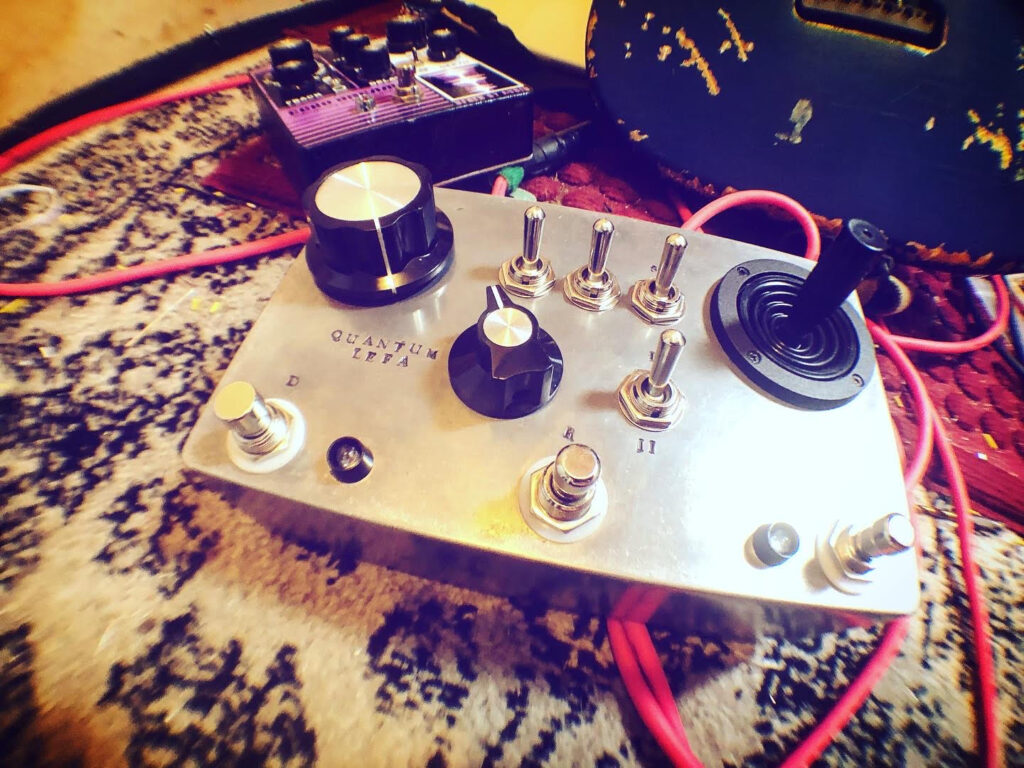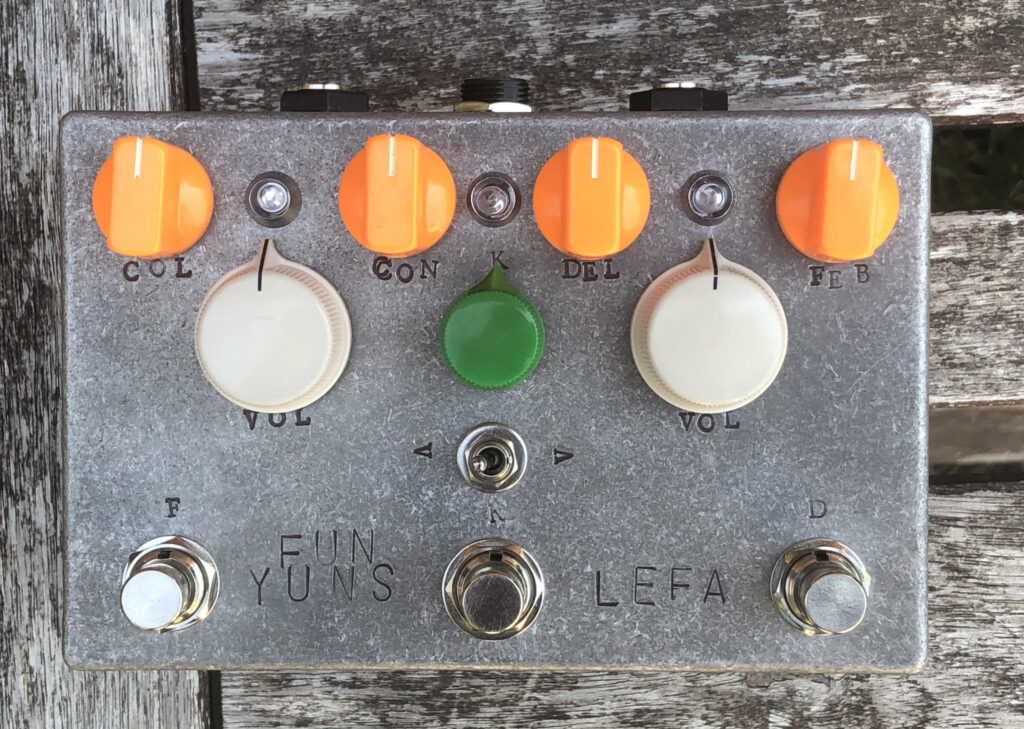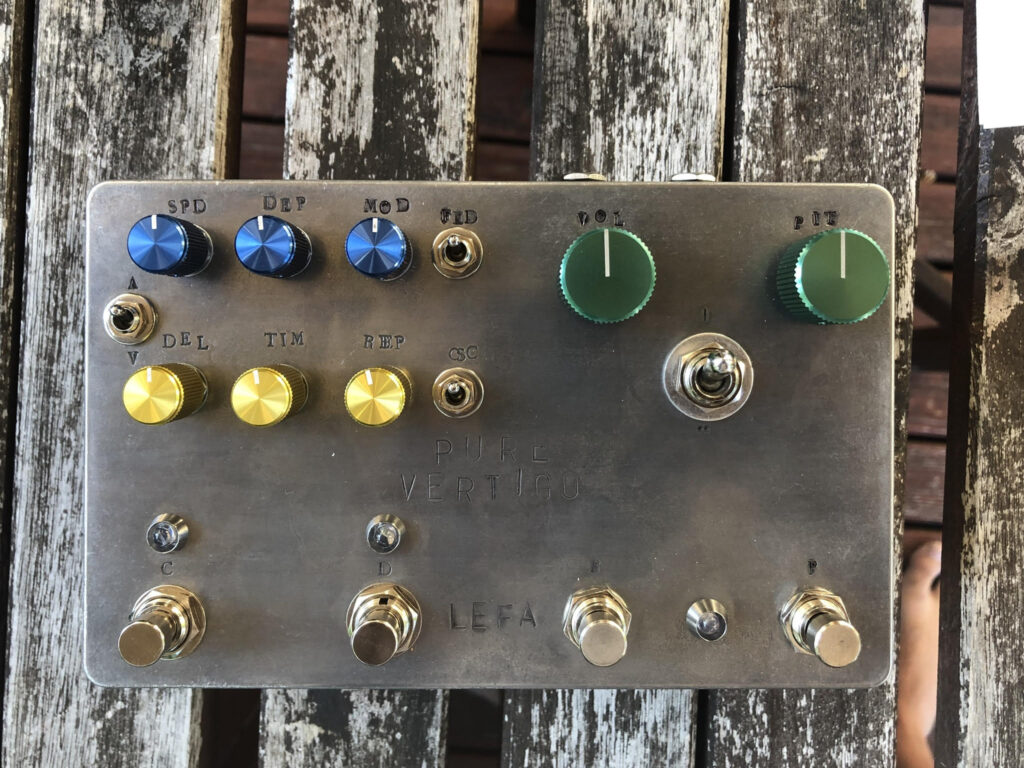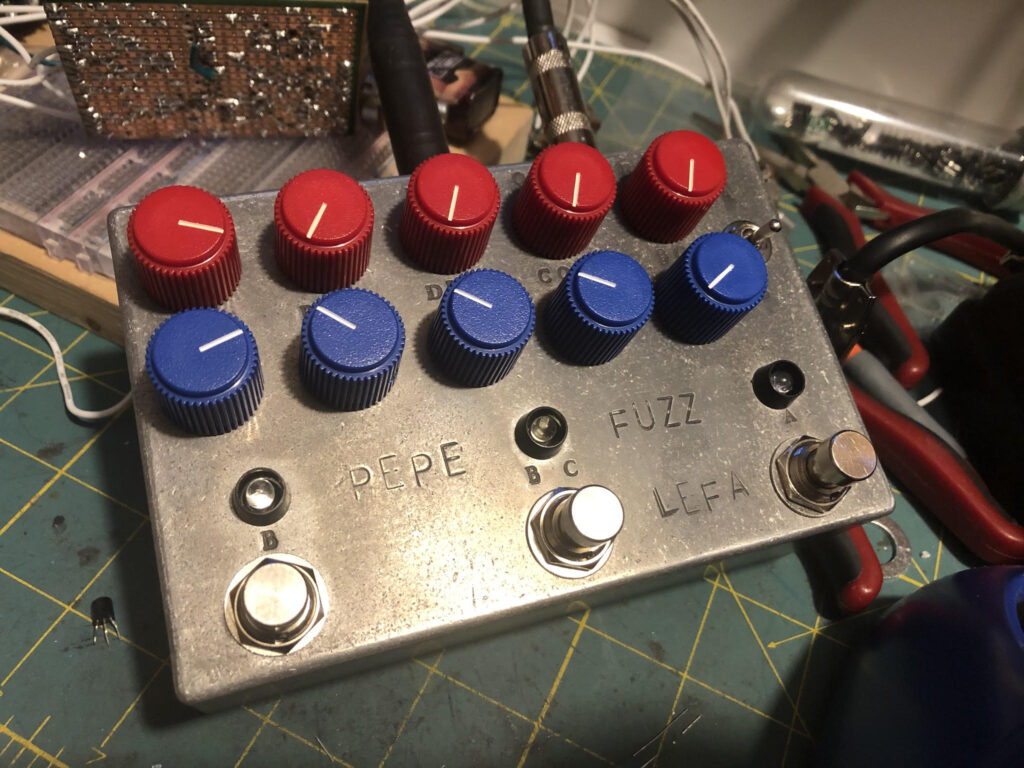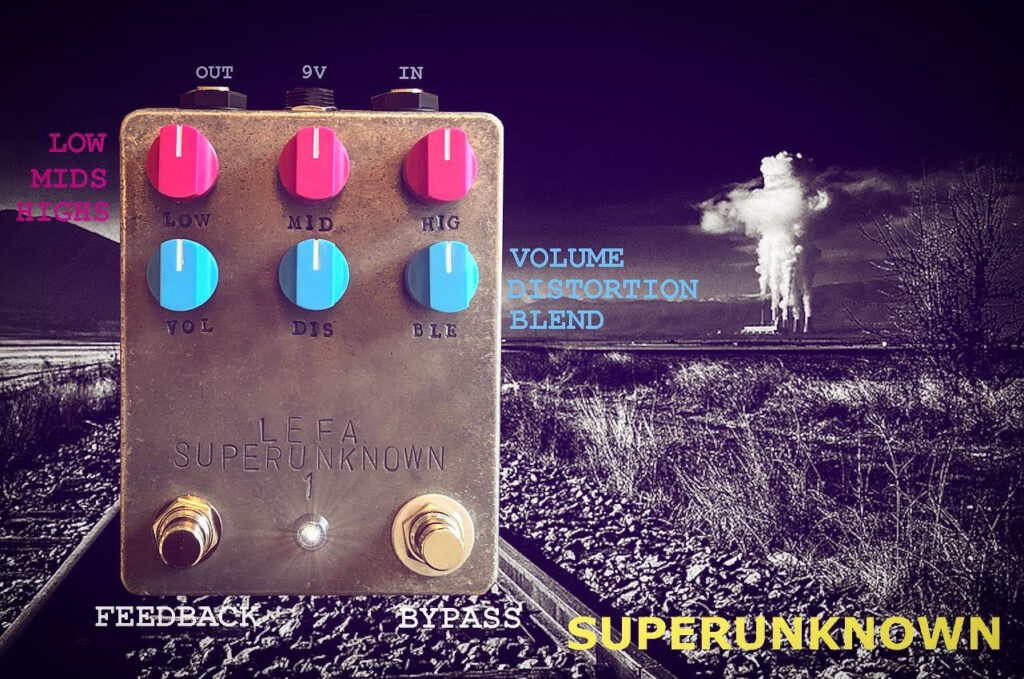My name is Luis Aznarez, I am from Barcelona, Spain
and I have a pedal company called Lefa Pedals
located in Seattle, Washington
www.lefapedals.com
How long have you been a musician? How did you get into it in the first place?
I started playing bass more than 25 years ago. A friend from school told me to join his band. My musical knowledge at that time was practically non-existent, I thought that a bass was a 4-string guitar that did not sound. As time went by, I grew affection to that piece of wood that they put in my hands and it ended up becoming my passion, it became like the air I breathe, and the only thing that I can do really well. Now after hundreds of records recorded and thousands of concerts around the world, I can’t imagine myself doing anything else, music is what I do and music is who I am.
Who have been some of your major musical influences, past or present?
The first person that influenced my life, many years ago, I was probably 13 years old or so, I fell in love with the music of The Doors and the attractive personality of Jim Morrison. His words and his madness captivated me. I wanted to be and live like him. Luckily, before reaching 27, another of my influences appeared in my life. Xavi Malacara. A singer from Barcelona, a bit older than me, with a lot of experience on him, who knew how to see me and see who I really was. He grabbed the 20-year-old boy I was, wanting to destroy everything and believing my truth, and he transformed me into the best version of myself. Both musically and personally. I have played with him in all the projects he has been in and I can’t imagine not being by his side on stage. I love him infinite. Another great influence in my life and perhaps the most recent is Jason Ricci. A blues harmonica player who lives in New Orleans, he was in jail for drug problems and has had no problem explaining to this patriarchal world of blues music his bisexuality and bipolarity. He doesn't care what people think of him. And apart from being an exceptional musician, his way of understanding music and life has completely captivated me. Fortunately, I had the great luck of meeting him in person a couple of years ago here in Seattle and it was one of the most magical moments of my life.
Finally, I am aware of who I am, and I know that living with someone like me at certain times should not be easy. Music implies dedication and at times it takes absolute abstraction of all responsibilities to be able to give the best of you on stage. Those of us who opt for not following the steps that society wants you to take, with a stable job, a salary at the end of the month to feed your family and be able to pay your mortgage, we know that life around music is gratifyingly and at the same time it can be tough. Luckily, an angel crossed my life, with whom I fell completely in love from the first moment I saw her. I was on top of a stage playing and she kept staring at me while she danced. Since that first day we have always been together and she has known how to support me in all the steps I have taken and she has always been there to pick me up from the ground when I have fallen. She has sacrificed many more things than I have to make me happy and she has had to fight through thick and thin to show her family, her bosses and the world how good she is. Always doing it with a smile on her mouth and without abandoning her values for a second. That lioness strength is my wife and biggest influence every day.
What led to the start of Lefa Pedals? How long have you been in business? How big is your operation/how many employees do you have?
Well, the beginning of Lefa was a mixture of accidents and curiosity in equal parts. For many years I have always played with a rat under my feet. Specifically, a Turbo Rat, the first one I had, I had it for many years, until during one of my concerts I dropped a full beer on it and it stopped playing. It felt so bad for me to lose that pedal that accompanied me for so many years, so I decided to open it and fix it on my own. I never managed to fix it; I had no idea what I was doing so I surely destroyed it more than it was. In the end, I bought a new one. At the same time the guitarist who was playing with me also broke the jack input of his Rat, this model was the classic, not the turbo like mine, and I offered to fix it, without having learned anything from the previous pedal. He trusted me and let me give it a try. Once opened I realized the few differences that existed in the circuit between the Turbo Rat and the classic so I did a little research to find out the sonic differences between the different components. So apart from fixing the jack input of my friend’s pedal, I actually changed certain components of his classic Rat to make it more similar to the Turbo Rat. I never told him what I had done with his pedal. To this day he continues to play with that pedal and is very happy with how it sounds. I guess if he is reading these lines, he will be realizing what I did to his pedals, I hope he doesn’t get mad at me.
Once I realized what I had achieved by changing a couple of components, I dedicated myself to modifying pedals, DS1, tube Screamers, especially what I tried was to make them more friendly with the presence of the bass in my bass. At the beginning I did all this more as a hobby than anything else, until a couple of years ago after buying a Red Panda Tensor I had the opportunity to build my own controller thanks to the scheme that they share on their website. That was the first pedal with the name Lefa in the enclosure. The name Lefa means “cum”. I decided to put that name as a joke to the whattsap group that I have with my best friends in Spain and it turned out that I love the sound of it. After that first pedal, a friend asked me if I could make him a fuzz and little by little Lefa became what it is today. A shed in my garden where I spend all the free hours that I have making custom pedals to order. I do not manufacture two equal pedals, each Lefa pedal is unique and unrepeatable and I think that is the signature that differentiates Lefa from others. Each person has a totally unique style when it comes to playing and I think that this uniqueness also must be reflected in the pedals they have.
Did you have formal schooling, or are you self-taught? Take us through that story:
I started studying law and later graduated in lighting engineering specialized in stage lighting. So I have a bit of electrical knowledge but 95% of everything I do with pedals is based on trial and error, reading a lot, opening pedals that I like and thanks to the internet I absorb all the information I can.
What drives you as far as new pedal creation is concerned? How long does it typically take for an idea to come full circle and become a demo pedal? What’s the process behind new gear, and the eventual release of it to the public?
The process of creating my pedals begins by talking with the client, asking them a thousand questions, about what music they like, what instruments they play, what are their favorite groups, what size of foot do they fit, what food is their favorite, if they like pineapple on pizza, etc. The more information I have the better. From there, together with the idea of the sound that my client is looking for, we get to work together to design the pedal. Starting with the sound, the components, the size of the enclosure, the layout of the controls, the color of the knobs, the name, everything is designed together between the client and me. Always trying to find the craziest side of any effect, I usually do things outside the standards, that's the area where I feel most comfortable. If you are looking for a pedal with a good classic sound, don’t ask about me, there are thousands of manufacturers out there that make wonderful pedals, if what you want is that your sound is unique, crazy, sick and original, I am your person. This process, from the embryonic idea to the fully finished pedal, usually takes me approximately two to three weeks or so. Right now, I have a waiting list to start new pedals of a month. Almost all my clients are from the USA but lately I have been getting orders from all over the world.
What are some of the biggest concerns facing your profession today?
I think one of the biggest problems that someone who offers a service to the public faces is the internet. On the one hand, it offers great information that the internet offers, and on the other hand it gives the public some anonymity, and this is a double-edged sword in a world where what people think of your product is very important. Your creation must stand out from the rest of the world and convince a client in the shortest time possible with the best quality you have. And if one of these elements fails, you can face the worst criticism possible. I’ve had problems because a pedal arrived in bad condition due to shipping, a fault in a transistor, a power supply in bad condition, whatever it is that makes your product not work. And I have had clients who have understood these circumstances that are beyond our control and others who have blamed me for all the evils in the world; in these cases the best thing you can do is recognize your mistakes and try to stop this client from speaking or making a bad and unfair review of you because that can cause you ruin. We live and depend on the digital world, we have to be fast, competitive and efficient as machines in a world as artisan as ours, sometimes this voracity is very dangerous.
Where do you see pedal building going in the future, especially amidst the Covid-19 pandemic?
I believe that the future of our product will be based on the perfect harmony between digital and artisan. We cannot forget the era in which we live and the fact that we are able to combine the encoding with analog products of extraordinary quality, this in my opinion will open a life of new pedals and sounds that is still to be discovered.
Who are some of your favorite builders in the industry right now?
I have a huge soft spot for everything that goes through Oliver’s head at the helm of Death By Audio. It was the first time that I felt that something was designed and manufactured for me. But once I started building my own pedals, I realized the great world of pedal builders. I live in Seattle and there is a stream of people making pedals in the Pacific Northwest that are wonderful, like Spun Loud Effects, Dirty Hahgard Audio, Blammo Electronics, Abominable, Fuzzlord to name a few. More nationally, Mantic, Adventure Audio, CKAudio, Malaise Forever, Red Panda, Electrofoods, Hilbish Design and internationally jewels such as Comodoro, Ananashead or Decibelics from Barcelona, Dr. DRive in Madrid, Vander Effects in Argentina, Zero Fret and Tate Fx in UK, 6 Degrees in Canada, Coda in France, Sehat Effectors from Indonesia, Carcharias from Israel or Animal Factory from India.
Name the last 5 records you listened to:
1. Elastica – Elastica
2. Luminiferous – High On Fire
3. Trolls Soundtrack
4. Godzilla´s / Eatin Dust – FuManchu
5. Contra todo pronóstico – Joan Colomo
Klon hype: Love it or Hate it?
The truth is, I’ve never been into this Klon thing. I don’t know much about it, sorry.
Any last comments, or anything you’d like to talk about?
I wanted to thank you, Mike, for all the support you offer to this fun community of pedal builders. With you and with people like you, all this sounds a lot better. Stay healthy and make a lot of noise…
Thanks so much to Peter for taking the time to answer some questions! Make sure to go check out goosetheband.com, and check their tour page to see when they’re headed to a town (or virtual venue) near you! Cheers!
Other interviews you might enjoy:
GET EXCLUSIVE UPDATES, CONTEST INFO, SEE OUR LATEST DEMO VIDEOS AND MORE:












